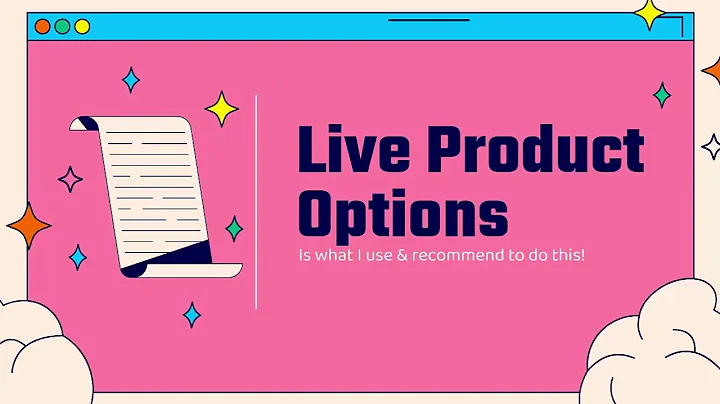Shopify vs Wix: Which E-commerce Platform is Right for You?
Table of Contents:
- Introduction
- Background of Shopify and Wix
- Plans and Pricing
- Shopify Plans and Pricing
- Wix Plans and Pricing
- Website Themes
- Wix Themes
- Shopify Themes
- Design Customization Options
- Wix Design Customization
- Shopify Design Customization
- Ease of Use
- Wix Ease of Use
- Shopify Ease of Use
- App and Plugin Options
- Shopify App Store
- Wix App Store
- Shipping and Fulfillment
- Shipping Options on Wix
- Shipping Options on Shopify
- Customer Support
- Customer Support on Wix
- Customer Support on Shopify
- Payment Providers and Transaction Fees
- Payment Providers on Wix and Shopify
- Transaction Fees on Wix and Shopify
- Conclusion
Shopify vs Wix: Which E-Commerce Platform is Best for You?
When it comes to building an online store, Shopify and Wix are two popular e-commerce platforms that many entrepreneurs consider. In this article, we will compare these platforms in terms of plans and pricing, website themes, design customization options, ease of use, app and plugin options, shipping and fulfillment, customer support, and payment providers and transaction fees. By the end of the article, you will have a better understanding of which platform is the best fit for your e-commerce needs.
1. Introduction
Building an online store is an exciting venture, but choosing the right e-commerce platform is crucial for your success. Shopify and Wix are both well-known platforms that offer a range of features and tools to help you create a professional and functional online store. In this article, we will analyze the key aspects of these platforms and compare them side by side, so you can make an informed decision when it comes to selecting the best platform for your e-commerce business.
2. Background of Shopify and Wix
Before diving into the comparison, it's important to understand the background and focus of both Shopify and Wix. Both platforms were founded in 2006, but they started with different core purposes.
Shopify was built from the ground up as an e-commerce platform, specifically designed to help businesses sell products online. It has a strong emphasis on providing e-commerce solutions and has years of experience in the industry. On the other hand, Wix initially started as a website builder, offering a platform for individuals and businesses to build websites easily. It only recently expanded into the e-commerce space by adding e-commerce features to its existing website builder.
This difference in focus and experience sets the foundation for the comparison between Shopify and Wix as e-commerce platforms. Now, let's explore the various aspects of these platforms to determine which one is better suited for your online store.
3. Plans and Pricing
When it comes to pricing, both Shopify and Wix offer different plans to cater to various business needs. Understanding these plans and their pricing structures is crucial in making the right decision for your online store.
Shopify Plans and Pricing
Shopify offers three main plans: Basic, Shopify, and Advanced. The Basic plan starts at $29 per month, plus transaction fees for every sale made on your store. The Basic plan includes features like unlimited product listings, 24/7 support, discount codes, abandoned cart recovery, and marketing automation. The main difference between the plans lies in the transaction fees, with the more expensive plans having lower fees. As your store grows and generates more revenue, upgrading to a higher-tier plan can help reduce transaction fees.
Wix Plans and Pricing
Wix also provides three plans specifically for e-commerce: Business Basic, Business Unlimited, and Business VIP. The pricing starts at $34 per month for the Business Basic plan. Each plan offers different features, with the higher-tier plans providing more advanced options. It's worth noting that Wix does not reduce transaction fees for the higher-tier plans. While the monthly subscription fee may be higher, the overall cost may still be lower compared to Shopify due to lower transaction fees per sale.
In terms of pricing, both platforms offer competitive plans, but Shopify's basic plan is slightly cheaper when paid monthly. However, Wix's plans can be more cost-effective for merchants who generate a high volume of sales, as the lower transaction fees can offset the higher monthly fee. Ultimately, the plan you choose will depend on your specific business needs and expected sales volume.
4. Website Themes
The visual appeal of your online store is crucial in capturing the attention of potential customers. Both Shopify and Wix offer a wide selection of themes to help you create a visually stunning and professional website.
Wix Themes
Wix offers hundreds of free themes for online stores, ensuring that you can find a design that suits your brand and product offerings. These themes are ready-made and optimized for different types of online stores. However, it's important to note that not all Wix themes are fully responsive. This means you may need to make adjustments to ensure your website looks good on mobile devices. Wix does have the Editor X, which allows for fully responsive designs, but this feature is more suitable for advanced users and agencies.
Shopify Themes
Shopify, on the other hand, provides nine free online store themes, with the option to browse their premium theme library if none of the free options suit your needs. While the free themes may be limited in number, they are fully responsive and designed to look good on both desktop and mobile devices. If you require more customization options or specific design features, you can explore the premium themes available for purchase. These premium themes range in price, typically costing around $300 as a one-time fee.
In terms of themes, Wix has a clear advantage in terms of quantity, offering a wide range of free options for online stores. However, Shopify's themes are fully responsive out of the box, ensuring a consistent user experience across different devices. Depending on your preference for design customization and mobile optimization, either platform can fulfill your requirements.
5. Design Customization Options
Creating a unique and visually appealing online store often requires customizations to match your branding and create a personalized customer experience. Both Shopify and Wix offer design customization options, although their approaches differ slightly.
Wix Design Customization
Wix provides a drag-and-drop interface that allows you to easily add and customize elements on your website. This level of flexibility makes it straightforward for beginners to design their online store without much prior knowledge or experience. You have complete control over the placement and appearance of elements, enabling you to create a website that aligns with your brand vision.
Shopify Design Customization
Shopify takes a different approach to design customization. While it doesn't offer the same level of drag-and-drop flexibility as Wix, it provides a more streamlined and structured approach. Shopify themes come with predefined positions for elements, and you can customize these elements using the options available in the side menu. The focus is on creating a visually appealing store without overwhelming users with endless customization possibilities. This approach ensures that your website maintains a professional look and feel while still allowing for some level of customization.
Both platforms have their strengths in design customization. Wix offers more flexibility and control, making it ideal for users who prefer a hands-on approach to design. On the other hand, Shopify's structured approach makes it easier for beginners to create a visually appealing store without getting lost in a sea of options.
6. Ease of Use
Building and managing an online store requires a platform that is user-friendly and intuitive. Let's explore the ease of use of both Shopify and Wix to determine which platform offers a smoother experience for beginners.
Wix Ease of Use
Wix has made a concerted effort to make website building as simple as possible for absolute beginners. The platform offers an ADI (Artificial Design Intelligence) website builder that guides users step by step through the process of setting up a beautiful website. By answering a few questions and selecting preferred designs, Wix automatically designs an online store tailored to your needs. This approach reduces the time and effort required to create a website, making it accessible to users with minimal design skills.
Shopify Ease of Use
While Shopify doesn't have a dedicated AI-driven website builder like Wix, it is still fairly straightforward for beginners to build their first online store. The platform provides a user-friendly interface and offers comprehensive step-by-step tutorials and resources to guide users through the process. Shopify's focus on e-commerce ensures that everything about the platform is optimized for selling online, removing unnecessary distractions and streamlining the user experience.
Opinions on ease of use can vary from person to person, with some finding Wix easier to grasp due to its simplified website building process. However, many users appreciate Shopify's intuitive interface and the platform's specific focus on e-commerce features. The best approach is to try out both platforms and see which one feels more comfortable for your individual needs.
7. App and Plugin Options
Adding additional functionality and features to your online store often requires the use of apps or plugins. Both Shopify and Wix have app stores that offer various integrations to enhance the capabilities of your online store.
Shopify App Store
Shopify boasts a large and diverse app store, with over 7,000 apps available for users to choose from. These apps cover a wide range of functionalities, including marketing, customer service, inventory management, analytics, and more. Many of these apps are free to use, while others may require a one-time or subscription-based payment. The extensive selection ensures that you can find the right app to meet your specific business needs.
Wix App Store
Wix offers a more limited selection of apps compared to Shopify, with around 300 apps available in its app store. The smaller app store can be attributed to Wix's relative newcomer status in the e-commerce space compared to Shopify. However, it's important to note that Wix's app store still covers most essential functionalities, including marketing, customer support, analytics, and payment gateways. While the selection may be smaller, it is still sufficient for many online store owners.
The availability of a wide range of apps can greatly expand the capabilities of your online store. In this aspect, Shopify has a clear advantage, as its larger app store offers a greater variety of options. However, Wix's app store still covers essential needs, and the selection may be more than sufficient for many users.
8. Shipping and Fulfillment
Efficient shipping and fulfillment processes are essential for delivering a positive customer experience. Both Shopify and Wix offer various options to manage shipping rates, calculate shipping fees, and handle order fulfillment.
Shipping Options on Wix
Wix provides shipping options with USPS (United States Postal Service). While this is sufficient for many online stores, it is limited compared to Shopify's offerings. However, Wix does offer options to calculate shipping rates based on weight, price, or product, allowing you to provide accurate shipping costs to your customers.
Shipping Options on Shopify
Shopify offers more extensive shipping options, including UPS, FedEx, and USPS. It provides real-time shipping rates based on carrier prices, ensuring accurate and up-to-date calculations for shipping fees. Additionally, Shopify has its own fulfillment network, allowing you to send products to their fulfillment centers for storage, handling, and shipping. This can greatly simplify the fulfillment process for merchants based in the United States and making at least one sale per day.
When it comes to shipping and fulfillment, Shopify offers a more comprehensive set of options. The inclusion of real-time shipping rates and the availability of their own fulfillment network set Shopify apart from Wix in terms of convenience and flexibility.
9. Customer Support
Having responsive and helpful customer support is crucial, especially when you encounter technical issues or have questions regarding your online store. Let's compare the customer support offerings of Shopify and Wix.
Customer Support on Wix
Wix provides customer support via email, chat, or phone, 24/7. While availability is not an issue, the quality of the support can vary. Some users have reported that Wix's support agents may lack in-depth knowledge, leading to less satisfactory answers to complex problems.
Customer Support on Shopify
Shopify also offers 24/7 customer support through multiple channels. In terms of quality, Shopify's support team is generally praised for their prompt and helpful responses. Merchants often find that Shopify's support agents quickly understand their issues and provide effective solutions.
Both platforms offer adequate customer support, but Shopify's support is often regarded as more reliable and knowledgeable. Accessible and helpful support can be crucial when running an online store, so this is an important aspect to consider when choosing a platform.
10. Payment Providers and Transaction Fees
The selection of payment providers and the associated transaction fees can greatly impact your bottom line. Both Shopify and Wix offer integrated payment systems and the possibility to use third-party payment providers.
Payment Providers on Wix and Shopify
Both platforms provide their own integrated payment systems: Wix Payments and Shopify Payments. These options allow your customers to pay directly on your website using various methods, including credit cards, Google Pay, Apple Pay, and more. The transaction fees for both platforms in the United States are 2.9% of the sales price plus 30 cents, which is standard in the industry.
Transaction Fees on Wix and Shopify
One important distinction between Wix and Shopify is how transaction fees are calculated for different plans. Shopify reduces their transaction fees to 2.6% or 2.4% when you upgrade to the Shopify or advanced Shopify plan. On the other hand, Wix does not reduce their transaction fees based on the plan level. This means that even though you may pay a higher monthly fee with Shopify, the lower transaction fees may result in lower costs overall. However, if you require the use of a third-party payment provider, Shopify charges an additional fee of 0.5% to 2% on top of the provider's fee.
When considering payment providers, availability and transaction fees are important factors. If Shopify Payments is not available in your country, choosing Wix may be a favorable option as they do not charge additional fees for using third-party payment providers. It's advisable to check the availability of Shopify Payments and assess the potential impact of transaction fees when making your decision.
11. Conclusion
In conclusion, both Shopify and Wix are capable e-commerce platforms that offer a range of features and tools to help you build and manage an online store. The choice between the two ultimately depends on your specific needs and preferences.
Shopify is the go-to option for entrepreneurs who are serious about building an online store. With its extensive experience in the e-commerce space and a focus on selling products online, Shopify provides a comprehensive set of features and a streamlined user experience. The variety of plans, extensive app store, extensive shipping options, and excellent customer support make it an attractive option for established and growing businesses.
On the other hand, Wix may be a better choice for individuals who already have an established website on the platform and want to add e-commerce capabilities. Wix's drag-and-drop design customization, ease of use for beginners, and reasonable pricing plans make it an accessible option. Additionally, if Shopify Payments is not available in your country and you want to avoid additional fees, Wix may be a suitable alternative.
Ultimately, it's recommended to take advantage of the free trials offered by both platforms to test their functionalities and determine which one better suits your needs. Whether you choose Shopify or Wix, with the right approach and dedication, you can build a successful online store that attracts customers and generates sales.
Highlights:
- Shopify and Wix are popular e-commerce platforms for building online stores.
- Shopify started as an e-commerce platform, while Wix initially focused on website building.
- Shopify offers three plans with varying features and transaction fees, while Wix offers three business plans.
- Wix offers more free themes, but Shopify's themes are fully responsive.
- Wix allows for more drag-and-drop customization, while Shopify provides a more streamlined design process.
- Both platforms are user-friendly, but preferences may vary.
- Shopify has a larger app store with more diverse options.
- Shopify offers more shipping options and has its own fulfillment network.
- Shopify's customer support is generally regarded as more reliable and knowledgeable.
- Both platforms have integrated payment systems, but Shopify offers reduced transaction fees on higher-tier plans.
- Consider the availability of Shopify Payments and potential additional fees when selecting a payment provider.
- Shopify is recommended for serious online store owners, while Wix may be suitable for existing Wix users or those seeking a specific payment provider solution.
FAQ:
Q: Can I try Shopify and Wix before committing to a paid plan?
A: Yes, both Shopify and Wix offer free trials that allow you to explore the platforms and their features before making a decision.
Q: Can I use a third-party payment provider with Shopify and Wix?
A: Yes, both platforms offer the option to use third-party payment providers if you prefer not to use their integrated payment systems.
Q: Which platform is better for beginners?
A: Both Shopify and Wix provide user-friendly interfaces, but Wix's drag-and-drop customization may be more suitable for beginners who want more control over the design process.
Q: Can I switch platforms if I've already built my store on Shopify or Wix?
A: While it's possible to migrate your store from one platform to another, it can be a complex process. It's generally recommended to carefully choose the platform that best suits your needs from the beginning to avoid the hassle of migration.
Q: Can I sell internationally with Shopify and Wix?
A: Yes, both platforms offer the ability to sell internationally. However, Shopify provides more robust options for displaying prices in multiple currencies and offers real-time shipping rates with various carriers for international shipping.


















